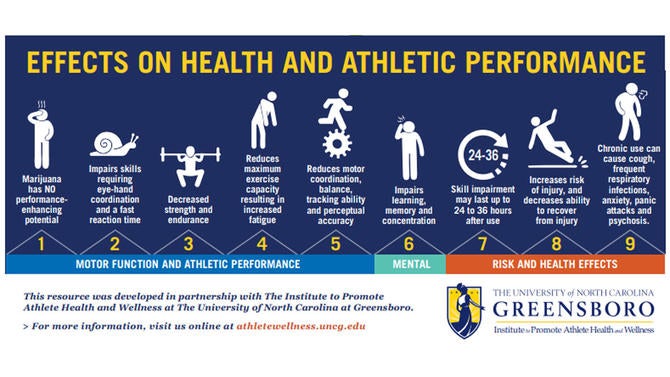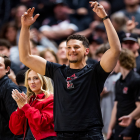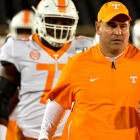It takes a lot for a Rutgers football player to get thrown off the team for smoking marijuana.
Five positive tests, to be exact.
That's a lot of pot.
That's also not an outrageous tolerance policy for college athletics these days. The NCAA and its member schools are increasingly breaking out marijuana testing from those involving sinister performance-enhancing drugs.
Some test for them separately. Some test for them less frequently. All of it reflects the fact pot is more socially acceptable than ever, and when it comes to sports, it definitely isn't performance-enhancing.
"I think in five years, [marijuana testing] is going to be gone," said Christian Dennie, a Fort Worth, Texas-based attorney who has helped negotiate, challenge and write drug policy at professional and amateur levels.
It's certainly trending that way. Four years ago, the NCAA and its members made their own statement. The penalty for a positive marijuana test was cut in half from a year to six months.
Rutgers may be somewhat of an outlier. New Jersey Gov. Phil Murphy is pushing for the legalization of marijuana.
In 2016, Rutgers instituted tightened monitoring for performance-enhancing drugs amid an NCAA investigation. But the school has also reduced penalties for marijuana use. According to Rutgers' policy, it isn't until the third marijuana positive that a Rutgers athlete faces possible game suspensions. It isn't until the fifth that he or she is kicked off the team.
"That is something that works for us," explained Paul Perrier, Rutgers' compliance director. "Our athletic director has a very liberal [stance] to marijuana because he feels like New Jersey is going to legalize it."
Overall, drug positives have hovered around 1-2 percent. Overseeing all of it is the National Center for Drug Free Sport in Kansas City, Missouri. The NCAA outsources its drug testing to the center, which also works with the NFL, MLB, NBA, WNBA and PGA.
"When the NCAA changed their sanction on marijuana, it seemed like everybody was at three strikes [before dismissal], then everybody kind of split out their marijuana sanctions to four, maybe five," said Erika Kuhr, senior director for Drug Free Sport.
"I don't know if there is anybody out there above five. But it doesn't mean they're not out there."
The NCAA's 2014 scaling back of marijuana sanctions basically piggybacked on a trend. As far back as 2010, the NCAA's competitive safeguards committee concluded a marijuana positive was not "considered cheating" the same way as a performance-handing drug.
Society is more tolerant. Recreational marijuana use has been legalized in nine states plus Washington, D.C. Thirteen states have decriminalized -- but not legalized -- marijuana. Medicinal marijuana is allowed in 30 states. A majority of Americans support legalization of pot. That support has more than doubled this century.
Its use continues to be a violation of federal law. The NCAA has banned marijuana for 32 years. It continues to test for it but only at championship events.
"Quite frankly, some athletes, the only thing they've ever known is their parents smoking pot at the table," said Dr. Brian Hainline, the NCAA's chief medical officer.
That's not a rationalization, it's a reflection. It is up to schools and conferences to conduct more extensive in-season testing on their own. Those policies can vary greatly.
The general reaction to drug positives has been one of counseling instead of penalties.
"We took a step back," Perrier said. "Anything that deters a student from getting help, whether it's from drug use or alcohol, really isn't what our program is based around."
Hainline says marijuana addiction -- not talked about as much as dependency to alcohol or harder drugs -- is absolutely real.
"The marijuana that we knew 30 years ago [does not compare] to what we know now," he said.
At some point, that creates a discussion about the medicinal uses of the drug. Hainline will be part of a conference next week with the Department of Defense and U.S. Olympic Committee on pain management.
Speaking to marijuana as a playing aid, Hainline said, "These are questions we really have to answer. Like with concussions and mental health, we're not waiting 35 years."
Former Colorado State running back Treyous Jerrells told The Coloradoan two years ago that he couldn't play without smoking. Jerrells was fighting pain from a surgically repaired knee.
"I practiced under the influence," he told the newspaper. "I played games under the influence. This is my medicine. I've seen players at CSU pop five, 10 ibuprofens before practice. Daily. You think that's good? Over the course of two, three years, that's eating your liver away. I'm not ashamed of what I did."
Colorado State compliance director Shalini Shanker says she has three marijuana dispensaries within a square mile of her home. Recreational marijuana was legalized in the state in 2014.
"A lot of people thought we would get an increase in recruits because marijuana was legal in Colorado," Shanker said. "All the sudden we're going to get these five-star recruits who want to come smoke weed.
"That has not been the case."
Colorado State initially saw a decrease in drug positives after the law changed. The last two years, the positives have gone up but mostly by those under the age of 18. The legal age for possession of one ounce of marijuana is 21 in Colorado.
To address all of it, the NCAA points to its Substance Abuse Prevention and Intervention tool kit. On Page 22 is a Marijuana Education Infographic that sums up why anyone should care at all about marijuana and football Saturdays.
In the lower-left-hand corner of the infographic is an avatar of an athlete in distress, his right hand pressed to his forehead.
It is obvious he is high.
"Marijuana," it reads, "has NO performance-enhancing potential."

![[object Object] Logo](https://sportshub.cbsistatic.com/i/2020/04/22/e9ceb731-8b3f-4c60-98fe-090ab66a2997/screen-shot-2020-04-22-at-11-04-56-am.png)

















